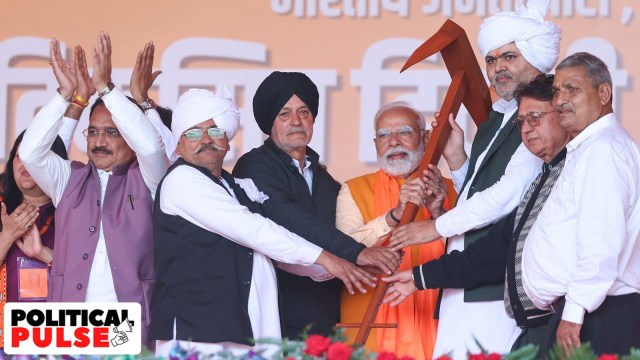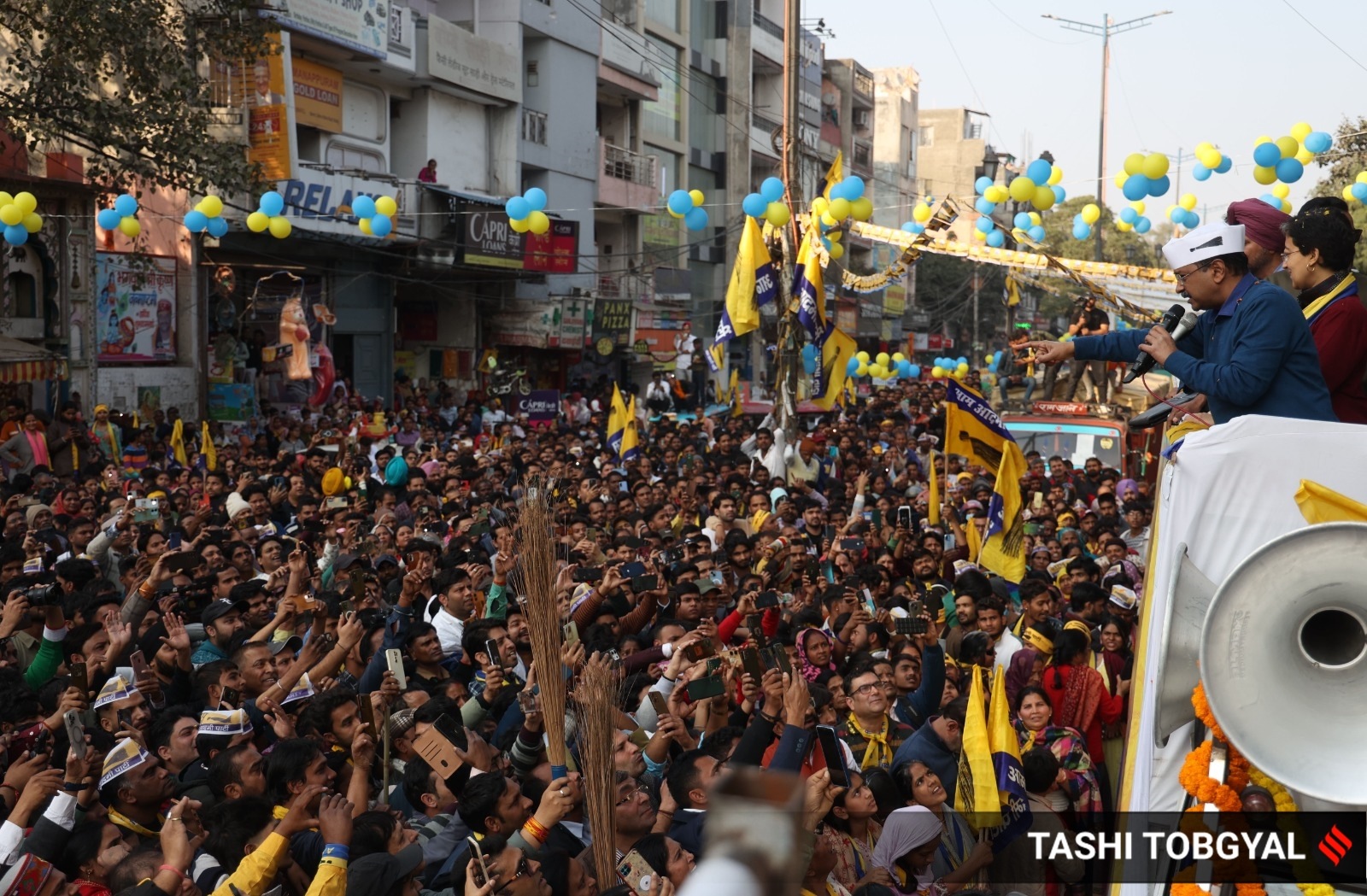BJP’s capital hope: AAP vehicle for change stuck – at the bottom
Anti-incumbency has made increasing dents over the years, sharpened by the AAP government’s patchy and uneven delivery.
 Prime Minister Narendra Modi at a BJP campaign rally in R K Puram. (Photo: BJP Delhi/ X)
Prime Minister Narendra Modi at a BJP campaign rally in R K Puram. (Photo: BJP Delhi/ X)In an arena where Congress is relegated to the status of a minor third wheel, on the other side from the 11-year incumbent AAP, is a Modi-BJP that has just returned for a third term at the Centre and is chafing at being out of power for 27 years in Delhi.
The BJP labels the AAP as a purveyor of “revdis” (or “freebies”) and, at the same time, assures voters it will not discontinue the existing schemes. It even tries to outdo the AAP with its own promises of cash transfers and subsidies – for instance, if AAP says it will give Rs 2,100 a month to women, the BJP pledges Rs 2,500 monthly.
Unlike in many other states, however, the BJP’s USP may lie less in the commitments it makes to individual labharthis — in the national capital, the AAP has beat the BJP to it. It lies, more, in a set of appeals that are also a prominent part of the BJP’s multi-layered pitch elsewhere: Prime Minister Narendra Modi’s invocation of larger, powerful wholes of “desh (nation)” and India in the world, and narratives of big “development”.
So far, in the capital, where aspirations grow even if living spaces become cramped, the BJP’s appeal, alongside the AAP’s pitch, has led to Delhi’s unique split ticket in the last two elections for the Centre and assembly — Modi at the Centre decisively, Kejriwal in Delhi overwhelmingly.
 AAP national convenor Arvind Kejriwal campaigning in Kalkaji, CM Atishi’s constituency. (Express photo by Tashi Tobgyal)
AAP national convenor Arvind Kejriwal campaigning in Kalkaji, CM Atishi’s constituency. (Express photo by Tashi Tobgyal)
As The Indian Express spoke to voters from Shaheen Bagh to Shalimar Bagh, from Sangam Vihar to Burari, and places in between, there were echoes of an earlier refrain: “Suvidha Kejriwal se mil rahi hai/ Desh ko Modi ji aage badha rahe hain (Kejriwal is providing us with basic necessities, Modi is taking the country forward)”.
In this election, however, that division of influence may not be quite as tidy, and the AAP is feeling the heat.
This is because while the AAP holds its own in the most vulnerable sections and in the Muslim minority (the Kejriwal-Modi ticket for the former becoming Kejriwal-Congress for the latter), among the rest, the story is more mixed. Here, the gap between the AAP and the BJP may be narrowing.
By and large, as you move up the ladder of income, privilege and opportunity — as a rough and ready measure, in households not benefited by the AAP’s provision of 200 units of free electricity because their monthly consumption exceeds the cut-off in increasing degrees — the BJP’s appeal, earlier largely confined to the Centre, may now be making inroads into the arena of the city.
To begin with, in these sections, the desire for change and the boredom with the same that the AAP once became a receptacle for, and which helped make it the most successful start-up in India’s recent political history, is now benefiting the BJP.
Anti-incumbency has made increasing dents over the years, sharpened by the government’s patchy and uneven delivery. There is a sense that the AAP stopped at a politics of “freebies” or subsidies, and that it lost its way especially in its second term, because of its own troubles or due to its unrelenting hostilities with the Centre-BJP. There is disillusionment and reproach: Does the AAP even have a plan for easing the growing pressures on the infrastructure and services of a burgeoning metropolis?
From uncleared garbage mounds across the city to lengthening traffic jams, from potholed roads that are not repaired or only temporarily, to blocked drains and uncovered sewer lines and mounting air pollution — these questions are raised, more, by those who are not hanging on by their fingernails, those who live in spaces that afford them a view of the city.
To many, and especially to the young in these sections, Delhi under AAP looks like a vehicle for their aspirations that is sputtering and stalling.
 Wayanad MP Priyanka Gandhi campaigning for Congress candidate Abhishek Dutt in the Kasturba Nagar Assembly constituency. (Express photo by Praveen Khanna)
Wayanad MP Priyanka Gandhi campaigning for Congress candidate Abhishek Dutt in the Kasturba Nagar Assembly constituency. (Express photo by Praveen Khanna)
In tandem, there are increasing signs of a Hindu consolidation that no longer depends on the big or live issues of mandir-masjid. It rears its head in an everyday fear and emboldened prejudice, thinly wrapped in euphemisms like “worsening law and order”, unvarnished in spectres of infiltrating “Bangladeshis”.
In Sangam Vihar, a group of men talk of the “crime rate” and a “shamshan ghat vs kabristan” controversy. Says Subodh Jha: “They closed down the nearby (Hindu) crematorium, saying it is unauthorised, but not the (Muslim) burial ground. It’s because of Kejriwal… Wherever BJP is in power, they control crime, just look at (Chief Minister) Yogi Adityanath in UP”. “We need a strong CM in Delhi”, says Ashutosh.
In another part of Sangam Vihar, Neha Mishra, UPSC aspirant says: “The main road has been bad here for 10 years, people fall and get hurt every time it rains.” “What do I do with the free bus ride? Relatives and friends don’t want to visit me because of the condition of the road”, says Meenakshi, a homemaker. “The AAP only makes excuses and blames its own failures on the L-G”, says Monu Mishra, a student of MA Political Science.
In Burari, property dealer Anshu Pal Singh says he voted three times for the AAP, but now wants “change”. “They worked for the first five years, and then nothing. Look at the jam in Sant Nagar, it can take upto two hours to cover a distance of 5 km… Burari has become a jail that you can’t enter or leave”. Vijay Joshi, who owns a showroom of bikes, says: “Sab baatein aadhi adhuri hain (all of AAP’s promises are incomplete). Now I will look at the candidate, not party”.
In Rajouri Garden, Sanjay Anand, a businessman, says: “AAP reneged on its promises… They said they will clean the Yamuna, make Delhi into a London or Paris.” On her morning walk in a park, Richa Puri, a wedding planner, says: “I voted for AAP in 2013, my children voted for it again … But we want clean air and a clean city. Who wants things for free? The BJP has an agenda, hamaari country hai toh hum hain (we exist only if our country survives)… And there’s one more issue. Why are Bangladeshis making Aadhaar cards in our country?” Says Subhash Bhandari: “Nothing is being spent on roads, or on the environment. Every October-November people like us have to head out of Delhi. It’s all because of freebies”.
By all accounts, the argument against AAP in the relatively well-off sections is not being made only by those who label its pro-poor subsidies as “freebies”, or those increasingly in thrall of a “strong” leader like Modi or Yogi.
Criticism also comes from those disillusioned by what they see as the AAP’s inability to take the next steps both in taking its own welfare push forward, and in making a more encompassing plan for Delhi.
In Shalimar Bagh’s DLF Mall, Puneet Chadha, a businessman who lives in Rohini, says: “I voted thrice for the AAP. We like it if our taxes are used to change the lives of the lower classes. My maid would tell me her child is going to a better school, there are PTMs … But the government school and the mohalla clinic should have been taken to the next level. That didn’t happen. Kejriwal needs to take a break, he is caught up in his own mess”.
And Abhinav Rishi, who works in the financial services sector, says “Temporary support to the poor is fine but you also need lasting solutions… You don’t need advanced technology to treat sewage and clear garbage. Delhi is not a poor place, it has the money”. He has sympathy for the AAP because the BJP is “by-passing the democratic government in Delhi by giving more powers to the L-G”, he says. “But 10 years later, the AAP cannot say, give us a chance.”
In the end, the election on February 5 could well turn on this — the numbers of those present and voting in the most vulnerable classes who feel beholden to the AAP for the delivery of basic necessities, versus the turnout in sections that feel the AAP has given all other needs short shrift.
The incumbent’s worry and the challenger’s hope will also be accentuated by the fact that there are no impermeable dividing lines in this city, where aspiration can quickly cross the gap, become a bridge.
- 01
- 02
- 03
- 04
- 05































